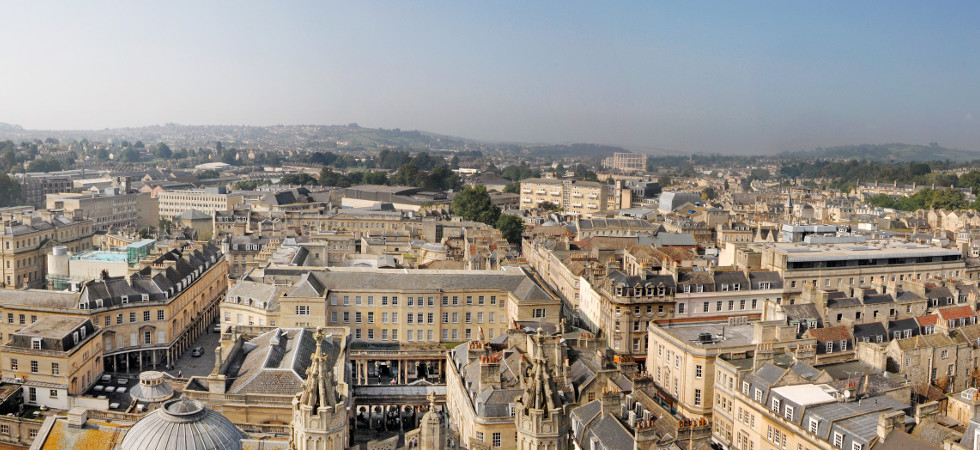Located in the county of Somerset, beside the flowing waters of the River Avon, the city of Bath offers visitors the opportunity to take a tantalising glimpse into its rich and vibrant culture and colourful history. Many flock to the city to admire its remarkable examples of Georgian architecture and of course it is the site of the Roman Baths, which date back to around 70 AD.
Bath was built upon natural thermal springs and over a million litres of steaming spring waters, at a constant temperature of 114.8 °F, flow into the Roman Baths daily. Legend has it that Prince Bladud, king of the Britons, discovered the springs around 836BC and after bathing in the waters he was cured of leprosy. The site quickly became a popular gathering place for the Celts, and a shrine, dedicated to Sulis, the Celtic deity, was duly constructed. Between 60 -70 AD an ornate temple was built on the site and the Romans named the town Aquae Sulis and constructed a compound of bathhouses located beside the temple and above the springs.
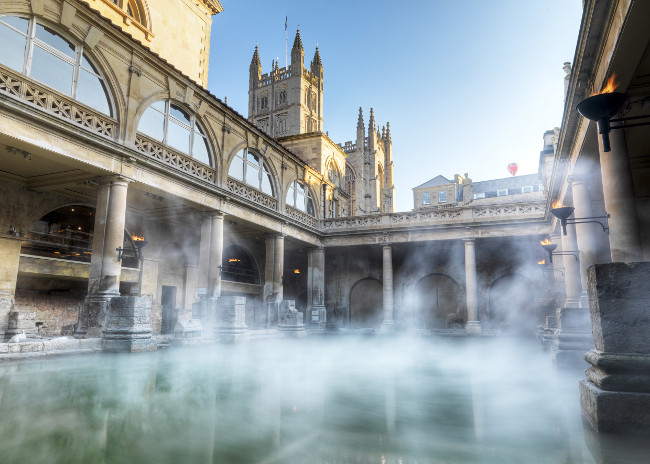
At the centre of the complex lies the open-air Great Bath, filled with steaming water and lined with lead, which of course is unsafe for today’s bathers but just walking on the original paving stones, in the footsteps of the Romans, is simply fascinating. Brief encounters with an assortment of characters dressed in Roman costume, all of whom are based on real people who lived over 2000 years ago and once lived or worked at this site, truly enhances the experience. I was most fortunate to meet a Roman stonemason who proudly showed me his leather hide foot coverings, held precariously together by thin straps, and lovingly hand made by his ‘dear wife’. He also complained vociferously that since being forced to become a Roman citizen, his income taxes continue to increase and it has become a great burden!
Be sure to visit the King’s Bath, which was constructed during the 12th century and which features a statue of King Bladud, and then head for the Pump Room to quench your thirst with a glass of the mineral-filled spring water, which is supplied via a modern bore hole.
For something a trifle stronger, head for the Roman Bath’s Kitchen right next to the Abbey on Hetling Court. The service is excellent and the menu presents contemporary British fare focusing on West Country produce. Choose a comfy seat outside and dine ‘al fresco’, sip on a glass of Bourgogne Pinot Noir, take part in the ancient sport of ‘people watching’ and then direct your attention to the scrumptious Cumberland sausage followed by the sticky toffee pudding.
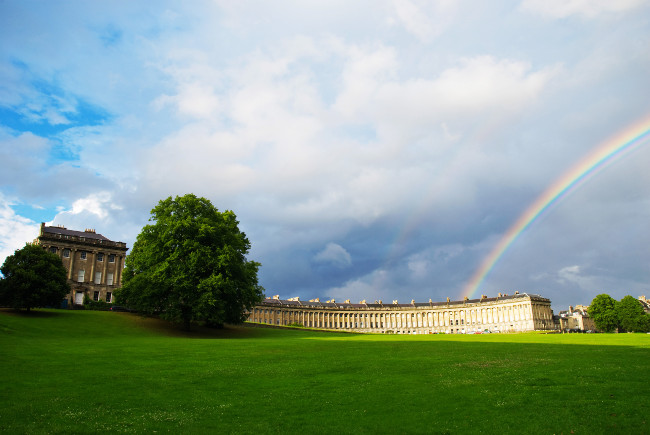
For those of us with an insatiable sweet tooth, the Fudge Kitchen, located steps away on Abbey Churchyard, offers a slice of heaven on a plate. You are sure to be tempted to savour more than a few nibbles of the hand crafted fudge, and with thirteen different flavours, including sea salted caramel, chocolate walnut and strawberries and cream, to choose from, it took me an inordinate amount of time to make a decision. Whilst you deliberate, take the opportunity to watch the on-site experts in the art of fudge making and consider purchasing home kits, which are splendid gifts for loved ones.
To work off that inevitable calorie overload, visit Bath Abbey and embark on the Tower Tour, which is fully guided and takes around 45 minutes. Climb the Abbey’s 212 steps, arranged in two spiral staircases, and make your way towards the top of the tower where you can visit the ringing chamber and the bell chamber. Stand on top of the Abbey’s vaulted ceiling and then sit behind the clock face and when you reach the summit you will be richly rewarded with an eye popping view of the city and the countryside beyond. However, if you prefer to remain on terra firma, be sure to view the beautiful stained glass window, which features King Edgar, the first king of England, who was crowned on the site in 973. That ceremony set the precedent for the coronation of all of our future monarchs including Her Majesty Elizabeth II.
If just the thought of that arduous climb leaves you feeling a trifle weary, the Thermae Bath Spa, located on Hot Bath Street, is the ideal place to unwind. The main spa offers bathers the chance to relax in two spacious baths and guests are welcome to use a series of fragrance diffused steam rooms. Take a dip in the open air rooftop pool and admire the spectacular views over the city whilst you are soothed by the warm bubbling water jets. The popular Minerva thermal bath features massage jets, a whirlpool and a peaceful lazy river and it’s the perfect spot to reflect on the morning and to plan your afternoon’s activities.
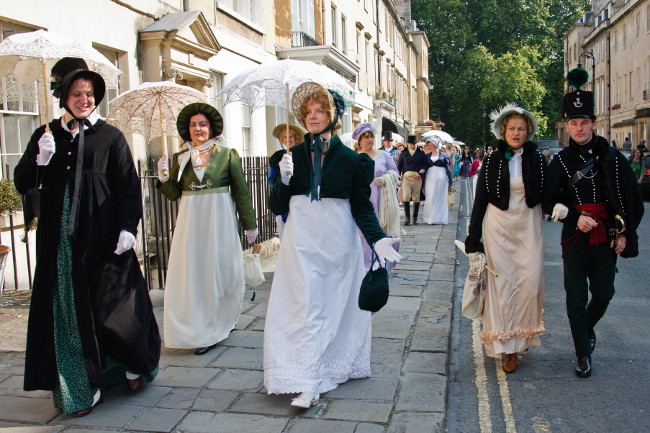
In 1987, Bath was recognised as a UNESCO World Heritage Site, and one of its best known Georgian treasures is the spectacular Royal Crescent, designed by John Wood the Younger. Built in the mid 18th century, the semicircular terrace of elegant townhouses is arranged around a lawn, overlooking the tranquillity of Royal Victoria Park, which was opened in 1830 by Princess Victoria at the tender age of eleven. The park covers 57 glorious acres and features a bowling and putting green, a boating pond, a golf course and a fragrant botanical garden.
For a first class luncheon take a short stroll along to The Circus and turn onto Brock Street and you’ll spot the Circus Restaurant. Listed in The Times at no. 4 of ‘20 secret restaurants that foodies love’ it offers an exceptional level of service and a wide range of delicious dishes. Order a bottle of the 2014 Pinot Blanc and consider sampling the ‘fish of the day’, which is delivered overnight direct to the restaurant and line-caught by boats sailing out of Newlyn, Cornwall, Beesands, Devon and Lyme Bay, Dorset.
After lunch, take a leisurely stroll along to The Circus, another of Bath’s Georgian gems, which was inspired by the Roman Colosseum, and consists of three curved sections of townhouses, designed by John Wood the Elder and built between 1754 and 1768. Due to the death of his father, only three months after construction began, John Wood the Younger completed his father’s work and it is a masterpiece with elaborate stonework and intricate features of acorns, serpents and Masonic and nautical emblems. A number of Heritage plaques are prominently displayed on some of the properties, where residents once included the explorer Dr David Livingstone, Major General Robert Clive known as Clive of India, William Pitt the Elder and the artist Thomas Gainsborough.
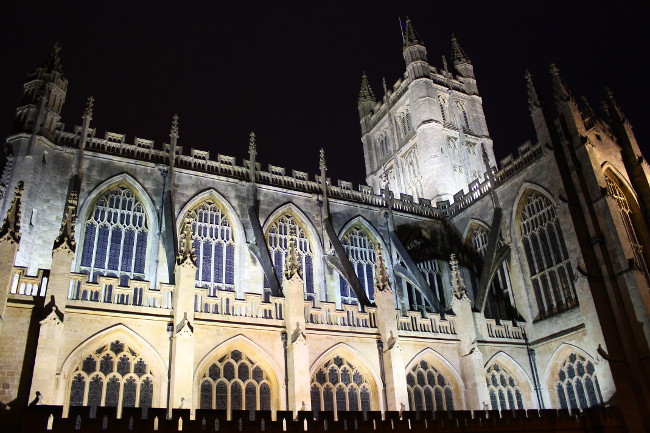
Another of Bath’s famous past residents is Jane Austen, the celebrated author of Pride and Prejudice, who featured Bath as the principle setting in her novels Persuasion and Northanger Abbey. Learn more about Regency life and visit the Jane Austen Centre, located on nearby Gay Street, where you will be greeted by guides wearing period costume and you too can dress up in the fashions of the day. Ladies are welcome to select a dress and a fancy bonnet and ‘get into character’ and as you wander around you’re sure to meet a number of ‘Elizabeth Bennet’s’ in the company of dashing ‘Mr Darcy’s’.
To continue with your relaxing afternoon, make your way to the riverside mooring just below Pulteney Pier and embark on the Sir William Pulteney. Select a seat on the upper open-top deck and admire the captivating beauty of Bath, sailing sedately along the river Avon for an hour. We were rewarded with the sight of an elegant egret and a couple of swans escorted by their six fluffy cygnets, born the previous week, and you may be fortunate to spot the family of playful otters and a kingfisher, known to frequent the route.
For animal lovers, Longleat is only 18 miles from Bath city centre and it is home to the BBC Animal Park, CBBC Roar and a host of other attractions. Celebrating its 50th anniversary, Longleat offers visitors the opportunity to experience a safari and view giraffe, rhino, zebra, cheetahs, tigers and two separate prides of lions and their eight adorable cubs; all roaming freely across hundreds of acres. You can also experience the ‘Monkey Drive Thru’ and watch their hilarious antics, but be prepared to be closely inspected and to pick up unexpected passengers on the roof, bonnet and boot of your vehicle. We travelled on the park’s tour bus and watched a car aerial being chewed and of course monkeys are very attracted to wind screen wipers!

The Jungle Cruise is very popular and sails slowly past snoozing hippopotami and a colony of bachelor gorillas bursting with energy. Passengers are encouraged to feed fish to the very vocal and demanding sea lions that follow the boat in earnest, leaping out of the water with abandon. Or you may prefer to travel on the Jungle Express train, which also provides views of the hippopotami, Californian sea lions and white pelicans. The Jungle Kingdom is where visitors can get close to giant anteaters, cape crested porcupines and chipmunks and you can visit a waddle of penguins, which children are absolutely mesmerised by.
I wandered around the Bat Cave and viewed a colony of bats fluttering around and others encased in their wings, fast asleep in the midst of the chaos.
For the ideal place for your slumber, the SACO serviced ‘aparthotel’ is a fine Georgian property located on St James’s Parade and it is within walking distance to all the city’s attractions. Accommodations are light and spacious with contemporary furnishings and include studios and one or two bedroom apartments with comfortable beds swathed in crisp white linens and plump pillows. Indulge in a late lie in, followed by your own homemade breakfast, and relish the freedom of not being restricted to a time table for meals, which of course the majority of hotels adhere to. Relax in a spacious open plan lounge and modern dining area and take advantage of a fully fitted kitchen with all the amenities expected, including a hob, an oven, a microwave, a refrigerator, a washer/dryer and a dishwasher.
Or, if dining out is a more attractive option, visit Hall and Woodhouse, on Old King Street. Housed within what was once Bonham’s auction house, this contemporary restaurant, furnished with Chesterfield couches in spacious seating areas, covers four levels and features a very popular rooftop terrace, which is the ideal spot to sample a glass or two of their award – winning Badger cask ales. The service is outstanding and the menu features a tempting selection of dishes including a succulent herb roast poussin and a delicious homemade baked treacle tart.
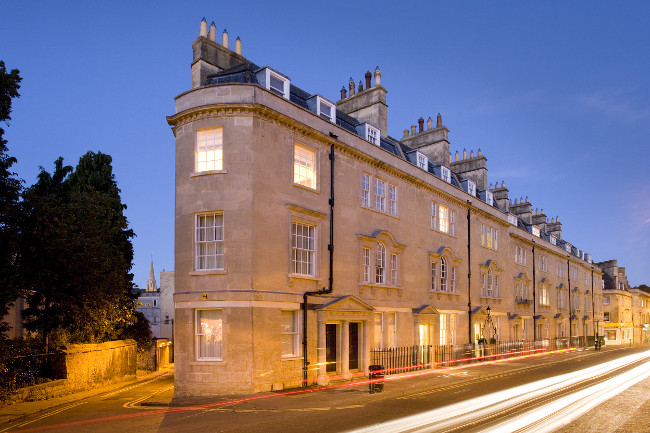
Treat yourself, visit Bath, and let the train take the strain. Avoid traffic delays and parking problems and hop on the direct Great Western Railway train service from London Paddington to Bath Spa. Sink back in the comfort of a first class seat, order a complimentary drink and snack and admire the views of the countryside whizzing past your window. The journey takes less than 90 minutes and for those visiting Longleat with GWR, Bath Spa to Warminster is less than 30 minutes or Westbury is less than 40 minutes.
Tip: For visitors to Longleat, travelling by train, disembark at Warminster or Westbury and make a reservation for a taxi to meet you at the station. For a prompt and efficient service, visit starlinetaxis.co.uk.
Tip: For more information on Great Western Railway train services, visit gwr.com.
For more information on Bath, go to VisitBath.co.uk.
Main image at the very top of the article credit: Colin Hawkins












